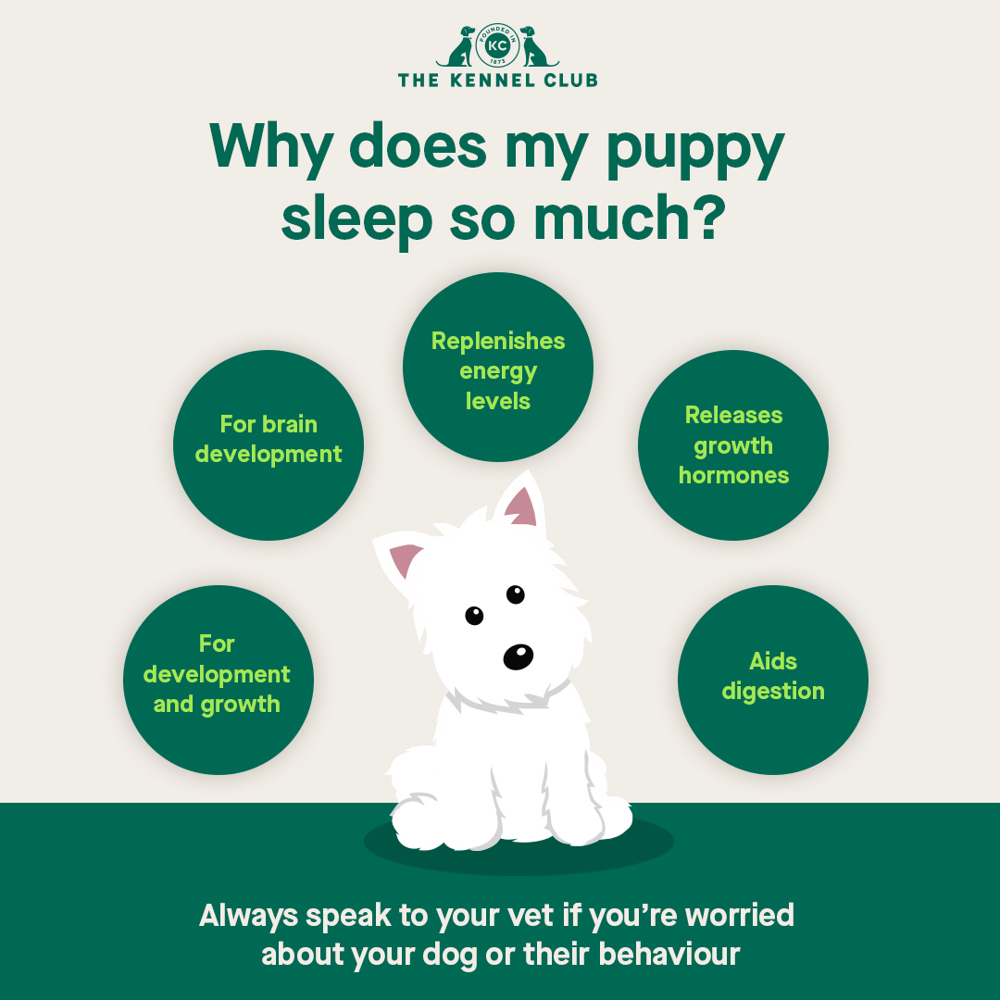
Dogs love a snooze. It’s easy to watch enviously as puppies nap. If only we could all sleep the day away! But have you ever wondered why puppies sleep so much? And have you ever been worried that your dog is perhaps sleeping too much?
Why do puppies sleep so much?
Puppies have very different sleeping patterns to adult dogs, and they tend to sleep a lot. Here are the key reasons why:
For development and growth
Puppies grow and develop very quickly when they’re young, and this is why their bodies need downtime, in order to repair and regenerate. When puppies sleep, their bodies are building muscle, bone and tissue - all essential for maintaining good health.
For brain development
When you’re a puppy, the world around you is totally new. There’s so much to learn and absorb! Sleep is essential for your puppy’s cognitive development. This helps them to process, remember and consolidate all the new information they’re receiving.
For replenishing their energy levels
Puppies are full of beans when they’re awake - constantly playing, running around and exploring. All that non-stop fun really burns up a lot of energy, and sleep is the ideal way to recharge the batteries.
To help release growth hormone
Deep sleep is good for growing puppies, as this is when growth hormone is released, an essential part of their physical development.
To aid digestion
Puppies can feel sleepy after eating, because energy is diverted to the digestive system instead. It’s very common for puppies to take a nap after eating.
How long do puppies sleep?
The amount of sleep puppies need varies as they get older.
The best lifetime dog insurance
Protect your dog with the UK's Number 1 pet insurer, with up to £25,000 cover for vet fees.
Newborns (0-2 weeks)
Newborn puppies sleep almost all day, around 90% of the time.
2-4 weeks old puppies
As puppies' eyes begin to open, they start becoming more active, but they still need 18-20 hours’ sleep each day.
4-12 weeks old puppies
Puppies are developing quickly during this stage, and sleep is essential for this part of their lives. They need 15-20 hours of sleep each day.
3-6 months old puppies
Puppies will start sleeping less as they reach the 6-month mark, but they still require 14-16 hours of sleep per day.
Over 6 months old puppies
Beyond 6 months, puppies will start to move to a more adult-like sleep schedule, which is around 12-14 hours each day. However, this varies between different dogs.
Is it normal for my puppy to sleep all day?
Yes, this is totally normal. And just because your dog is sleeping during the day, that doesn’t mean they won’t sleep during the night either! Don’t be alarmed if your puppy sleeps the day away - it means they’re growing, developing and resting in a way that’s healthy and normal.
So can I let my puppy sleep as much as they want?
Yes, but while puppies do love to sleep, there are some things to keep in mind.
- Puppies need a routine. This means they should get into a regular habit of eating, playing, going to the toilet, going for a walk and of course, sleeping. This helps them to get into a rhythm and understand that there’s a time and a place for everything.
- Puppies should sleep through the night. Babies wake up through the night when they’re young, and the same can be said for puppies. But as they get older, puppies should consistently sleep through the night. If they’re struggling with this, you should speak to your vet to rule out any underlying health issues.
- Puppies need good quality sleep. This means giving them their own cosy corner, which is quiet, safe and comfortable.
- Puppies need playtime and socialisation. Yes, sleep is important, but so is exercise, mental stimulation and socialisation, so that your puppy grows up to be healthy, happy and well rounded.
When should I be worried about my puppy's sleeping habits?
A puppy that sleeps a lot is no cause for alarm, but there are some behaviours that should raise a red flag.
- Sudden changes in your puppy’s sleep patterns: If your puppy seems excessively tired, or they’re refusing to sleep, it may be a sign of an underlying health problem.
- Restlessness: If your puppy has trouble settling down, even when they ought to be sleeping, it could also be cause for concern.
- Difficulty breathing: This could indicate respiratory problems or allergies.
Find a vet near you
If you're looking for a vet practice near you, why not visit the Royal College of Veterinary Surgeons' Find a vet page.
Find a dog trainer or behaviourist
Our online register helps you find accredited dog training instructors and canine behaviourists who have proven specialist knowledge, skills and experience.Think your dog may be affected?
If you're worried about your dog's health, always contact your vet immediately!
We are not a veterinary organisation and so we can't give veterinary advice, but if you're worried about any of the issues raised in this article, please contact your local vet practice for further information

